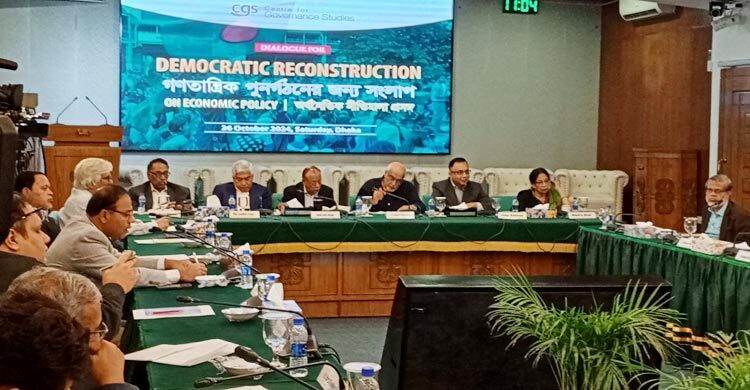Debapriya finds no reason to think this govt will do all reforms

Economist Debapriya Bhattacharya expressed skepticism about the interim government’s ability to implement comprehensive reforms. “If we think the interim government will solve all the problems with foreign assistance, we are living in a false reality. Everyone must take responsibility,” he said.
Debapriya made these remarks during the "Dialogue for Democratic Reconstruction," organized by the Center for Governance Studies (CGS) on October 26 at the Bangladesh Institute of International and Strategic Studies (BIISS) auditorium in Ramna.
As an honorary fellow of the Center for Policy Dialogue (CPD) and chair of the white paper drafting committee, Debapriya emphasised that reform discussions must account for economic foundations, which underpin any state.
He questioned whether government discussions adequately address landless citizens or fair pricing for agricultural products, indicating that economic reform needs to prioritise citizen welfare.
Discussing the government’s approach to reform, he outlined two main areas: institutional reform, which may include a reform commission, and electoral reform, for which an Election Commission (EC) search committee will soon be established. Beyond these, Debapriya highlighted the necessity of economic reform to ensure a well-rounded approach to progress.
He further elaborated on two essential components of reform: immediate, “accumulated” reforms and long-term developmental reforms. He cautioned against separating economic reform from institutional and electoral reforms, noting that a focus solely on the latter without economic improvements could hinder overall progress.
Addressing the priorities for the interim government, Debapriya stressed the need to protect real wages, ensure fair agricultural pricing, secure safety sectors, and provide equitable healthcare, education, and law enforcement access to all citizens.
FBCCI Committee Chairman Asif Ibrahim highlighted critical issues in the economy, noting that no measures have yet been taken to regulate product prices nationally, leading to persistent inflation. He warned of disorder in the banking sector, emphasizing the need for tighter regulations in both the banking and capital markets. Instead of relying on currency swaps, he advised seeking soft loans from donor agencies for more stable outcomes. Ibrahim also stressed that efforts to stabilize the market should prioritize strengthening supply chain mechanisms over enforcement tactics.
Former BCI President Shahedul Islam Helal criticized the prevalence of corruption, saying, "Nothing happens without bribery. We are losing a generation to this culture, which must change."
Shakeel Chowdhury, President of the Center for Non-Resident Bangladeshis, commented that banks have become political tools, noting that many entrepreneurs are now political figures rather than commercial leaders.
Former FBCCI President Jasim Uddin pointed out the need for infrastructure improvements to modernize supply chains and market operations, which he described as still heavily reliant on traditional methods. Another former president, Mir Nasir Uddin, emphasized that inflation will remain uncontrolled unless market management and corruption are addressed. He also noted the scarcity of gas, electricity, and dollars, stating that the private sector is struggling to survive under such pressures.
Mir Nasir further highlighted the need for a shift in the education system to produce industry-specific professionals, lamenting the private sector’s declining reputation. Urging the government to engage more actively with the business community, he called for accountability, stating, "Get involved with businessmen. Punish the criminals."
Former FBCCI president and BNP leader Abdul Awal Mintu voiced skepticism about the government's ability to address the nation’s problems, asking, "Who will solve it? Who will tie the bell around the cat's neck? There is no one willing to take on this responsibility within the government or even here."
He further criticized the reliability of economic data, stating that statistical information is "completely wrong." Mintu argued that if the government intends to implement all necessary reforms, it will likely fall short, and called for political unity and a commitment to further reforms.
The dialogue, moderated by CGS Executive Director Zillur Rahman, also featured insights from BCI President Anwar-ul Alam Chowdhury (Parvez), former BCI President Shahedul Islam Helal, former NBR Chairman Mohammad Abdul Majid, Daffodil Group Chairman Sabur Khan, and former Barvida President Abdul Haque.

